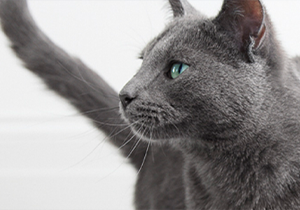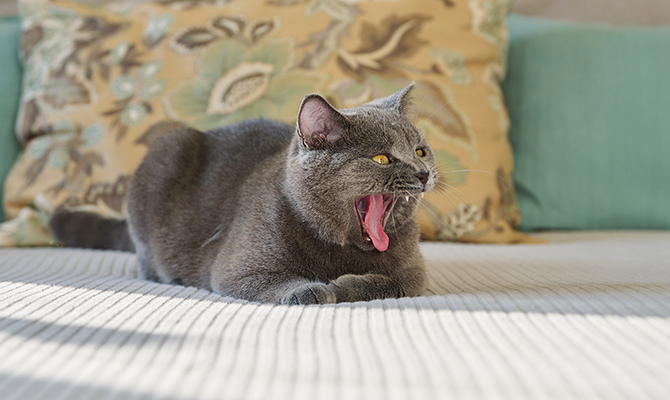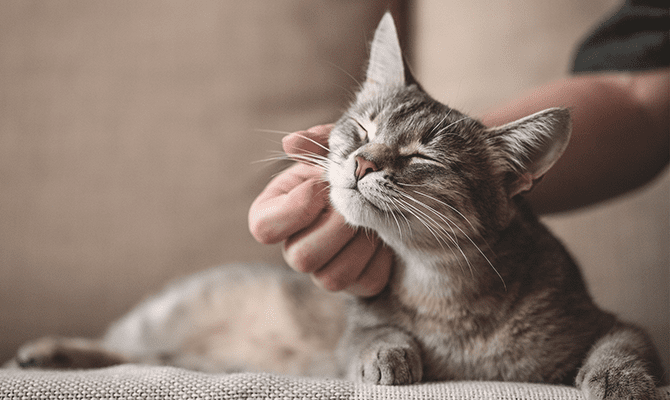Diarrhoea In Cats
Furry felines are known to experience bouts of diarrhoea from time to time, resulting in accidents around the house. In addition to indigestion, there can be several other causes of diarrhoea in cats, ranging from food sensitivities to parasites, and even bacterial infections when your kitty ingests something accidentally.
Diarrhoea in cats is not usually life-threatening, but severe cases such as blood in your cat's poop requires immediate veterinary attention.
The symptoms of mild diarrhoea in cats subside within a couple of days, but it can be annoying for your precious feline, so, here are some quick tips to remember when it comes to treating cat diarrhoea and what to feed a cat with diarrhoea.
What is Cat Diarrhoea?
Diarrhoea in cats is characterised by loose stools, usually with increased amount and frequency.
While diarrhoea in cats is common, it can still be annoying, as it can result in accidents throughout the house. And although diarrhoea in cats cannot be considered a disease in itself, it can be a sign of other underlying health disorders.
Cat diarrhoea is usually a result of a faster movement of faecal material through the intestine accompanied by a decreased absorption of water, electrolytes, and nutrients. Severe cases of diarrhoea can also result in mucous, blood, as well as worms present in the poop.
What are the Causes of Cat Diarrhoea?

Before we move on to treating cat diarrhoea, it is vital to understand the different causes of diarrhoea in cats as mentioned below:
-
Parasites
Internal parasites, as well as fleas, ticks and mosquitoes, are some of the common carriers of diarrhoea-causing parasites in cats. In addition to carrying serious diseases, parasitic action by hookworms and tapeworms can significantly affect your cat’s immune system, causing severe diarrhoea.
-
Infections
Infections caused by ingesting food unsuitable for feline consumption are a leading reason behind diarrhoea in cats. Additionally, cat diarrhoea is often a result of food allergies when your cat is sensitive to a particular ingredient present in their diet.
-
Dietary indiscretion or diet change
Cats are a creature of habit and a sudden change in their diet can cause gastrointestinal issues and indigestion, resulting in diarrhoea. Hence, it is important to gradually shift to a new diet or offer food for cats with diarrhoea if you suspect your kitty has an upset tummy.
-
Stress
Cats are not fond of changes, and a sudden change in their environment can cause cats to feel stressed, often ignoring their dietary requirements. As a result, stress can also lead to diarrhoea in cats, making it important to look after them in these changing times.
-
Primary inflammatory disorders
While digestive disorders, such as diarrhoea in cats are relatively common in cats, prolonged cases might suggest underlying disorders like primary inflammatory disorders, such as chronic enteropathy and inflammatory bowel disease that are genetically passed down to cats, and can cause a loss of appetite and vomiting other than diarrhoea.
-
Metabolic diseases
Although cats are known for their unending love for food, these silly furbabies often have trouble figuring out their capacity, and end up overeating. Eating more than they can stomach is a common reason behind metabolic diseases in cats that can cause loose motion in cats.
-
Medications/toxins
Strong medications and antibiotics can often have a lingering effect on your furry feline, manifesting as side effects including frequent vomiting and diarrhoea. Ingesting substances that are toxic and unsuitable for feline consumption, such as chocolate can also result in loose motion in cats.
What to Do If Your Cat Has Diarrhoea?
Wondering what to feed a cat with diarrhoea? Like most other feline health issues, cat diarrhoea can cause distinct symptoms. Look out for any noticeable changes in their behaviour if you suspect your furry munchkin is suffering from diarrhoea in cats. Also check for possible symptoms of cat diarrhoea such as frequent vomiting and loss of appetite to make it easier to determine the causes of diarrhoea in cats.
Cat diarrhoea is generally characterised by unnaturally loose or watery stool. Hence, increasing your kitty’s fibre consumption can be an effective treatment option. Since cat diarrhoea also results in a rapid loss of essential nutrients and moisture from the body, it is important to make sure your furry munchkin is well-hydrated and receives adequate food for cats with diarrhoea.
While the symptoms of cat diarrhoea generally resolve within a couple of days, it is important to consult vets and take them to the hospital if the symptoms persist for a prolonged duration. Do note the frequency and appearance of the stool to tell your veterinarian so they can diagnose the causes of diarrhoea in cats and advise how to treat diarrhoea in cats.
Can You Prevent Cat Diarrhoea?
- Preventing feline diarrhoea is possible.
- Control underlying diseases with appropriate medications and prescription diets.
- Avoid sudden diet changes or giving your cat human foods.
- Do not give rich or novel treats to avoid cases of acute diarrhoea.
Conclusion
Diarrhoea in cats is a fairly common health disorder. While it can be annoying, diarrhoea in cats can be easily treated at home and the symptoms usually resolve within a few days. As cat parents looking for and adequate medication for how to treat cat loose stools, the first step would be to identify the underlying cause of the problem.
Depending on the different factors and causes of diarrhoea in cats, there are several easily accessible treatments that your veterinarian may recommend to treat diarrhoea in cats. With the right treatment, your precious munchkin can get back to their happy, healthy feline ways in no time!
FAQs
-
What should I do if my cat has a diarrhoea?
Diarrhoea in cats is a common health disorder in our furry munchkins, so when it comes to what to feed a cat with diarrhoea, it is also important to make sure your kitty is hydrated, and has sufficient access to food to treat diarrhoea in cats.
-
What does diarrhoea look like in cats?
Cat diarrhoea is generally associated with the unhealthy consistency of their stool. In addition to an unnaturally loose or watery appearance of the stool, loose motion in cats can also have mucous or blood content in the loose motion in cats, as well as worms.
-
Does wet cat food cause diarrhoea?
The moisture content in wet cat food can give a softer consistency to your furry munchkin’s poop, but it does not cause cat diarrhoea. Diarrhoea in cats can be caused by a sudden change in the diet, low-quality food, and food allergies.
-
Should I stop food if my cat has diarrhoea?
Although diarrhoea in cats can sometimes be cause by ingesting unsuitable food, it is unwise to completely stop feeding your cat their usual meal if they have cat diarrhoea. Doing so can result in further loss of nutrients and moisture from their body.
-
How long does diarrhoea last in cats?
Diarrhoea in cats or loose motion in cats is a fairly common occurrence that usually persists for two days. Although the variation and consistency of the poop can differ in cats, the symptoms of mild cat diarrhoea generally resolve within 24 to 48 hours.










